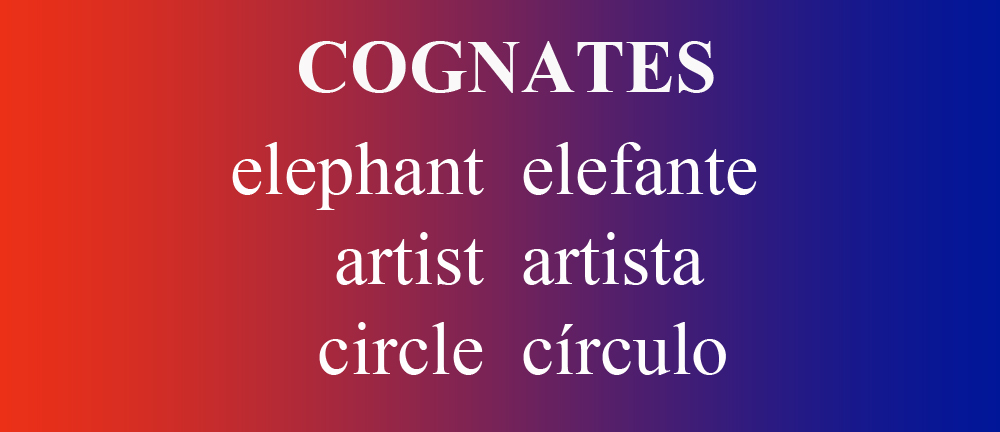 by guest blogger Karen Nemeth EdM
by guest blogger Karen Nemeth EdM
Cognates are pairs of words that sound alike and have the same meaning in two different languages. They are useful first steps in learning a new language.
How Do Cognates Work?
In English we say “elephant” and in Spanish we say “elefante.” English and Spanish speakers can easily make the connection between these cognates to learn and remember the animal’s name. In English, we say “frog” but in Spanish we say “rana.” Frog and rana are not cognates, and the lack of connection means learners will find those words harder to use and remember. We know that people need to use their new language to really learn it. Cognates make it possible for language learners at any age to use their new words right away. By starting with the cognate words, a learner can build their vocabulary and gain the confidence to add more words in their new language.
Find Cognates in Your Target Language
Spanish and English share hundreds of cognates and have borrowed from each other for centuries. There are also many cognates that connect German to English, such as “mouse” and “maus”. Other languages, like Chinese and Arabic, have fewer cognates with English words. Lists of cognate words in different languages can be found online. I created a resource for Spanish-English cognates in preschool and kindergarten called Language Castle Cognate Guide. It has user-friendly lists of simple cognates in the different educational domains to support early learning. Other cognate resources can be found at colorincolorado.org. Bilingual children’s books, or matching books in two or more languages, can also be great resources to find vocabulary connections.
Learning Activities Using Cognates
Research shows that teachers and families can help children learn a new language successfully when they use cognates to explain the meanings of words in conversations and stories. Look for examples of cognates to support the language learners you work with. Use the pairs of words to help children understand the characters, stories and facts in books. Plan activities around the cognates you have found. Add cognates to familiar songs. Use cognates in puppet shows or pretend play to give children more opportunities to practice and use the words. Highlight cognates on word walls or classroom dictionaries. Plan science and math lessons that use cognates to strengthen children’s comprehension. Building connections through cognates is a sure path to success.
Read more about what experts are saying about the importance of using cognates to build second language learning:
August, D., Carlo, M., Dressler, C. and Snow, C. (2005) The Critical Role of Vocabulary Development for English Language Learners. Learning Disabilities Research & Practice, 20: 50–57
Collins, M.F. (2010) ELL preschoolers’ English vocabulary acquisition from storybook reading, Early Childhood Research Quarterly, 25(1), 84-97
Gillanders, C. & Castro, D.C. (2011) Storybook reading for young dual language learners, Young Children, January 2011, 91-95
Lugo-Neris, M.J., Jackson, C.W., Goldstein, H (2008) Facilitating Vocabulary Acquisition of Young English Language Learners, Language, Speech, and Hearing Services in Schools, 41, 314-327
Pérez, A.M., Peña, E.D., & Bedore, L.M. (2010) Cognates facilitate young Spanish-English bilinguals’ test performance, Early Childhood Services, 4(1), 55-67
Wallace, Christopher, (2007) Vocabulary: The Key to Teaching English Language Learners to Read, Reading Improvement, 44.4 , 189-193
Be sure to check out languagecastle.com, Karen Nemeth’s website that offers a wealth of resources for anyone who teaches young children who speak different languages.
This blog post is linked with the monthly Creative Kids Culture Blog Hop. Be sure to check out other bloggers’ tips, teaching strategies, and resources!

